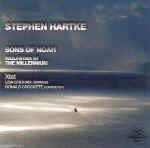Stephen Hartke particularly admires the composers who he calls the “three M’s”: Machaut, Monteverdi, and Messiaen. If you share his enthusiasms, then you’ll enjoy this disc, not just for the echoes of those earlier names, but also for the strikingly original synthesis that Hartke achieves in marrying the elements he emulates with his own very personal expressive idiom. Sons of Noah is a mini-opera for soprano (here the composer’s wife, Lisa Stidham), four flutes, four guitars, and four bassoons. It’s worth a listen merely to hear the amazing range of sonority that Hartke conjures out of this odd assortment of instruments–but there’s much more to it than that.
The story is essentially a sort of morality play in which Noah’s sons, even before the waters of the great flood subside, fight among themselves over which will get what piece of land when the time finally comes to disembark. So violent does the disagreement become that a serious fight breaks out, ultimately including even their wives, until Noah threatens to curse all of them unless the violence stops. The only weak dramatic moment comes at the end, when Hartke seeks rather clumsily to move beyond the universality of the story to include mentions of current trouble-spots between nations (you can probably guess the likely culprits). It’s an obvious and unnecessary tactic, but it’s over in a moment and certainly doesn’t diminish the achievement of Lisa Stidham, whose performance of all the roles is a tour-de-force of committed vocalism. Her only liability resides in the fact that her diction suffers in the upper register (what soprano’s doesn’t?), which wouldn’t be a problem were it not so clear otherwise.
Wulfstan at the Millennium is a wordless liturgy for 10 players, a form that may have its roots in works like the organ masses of composers such as Frescobaldi. The music ranges from the colorfully dance-like (Conductus), to the medieval (Motet), to a final Recessional: Toccata that sounds for all the world like Messiaen meets Lou Harrison (that is, Messiaen’s rhythm and feel for sonority combined with something of Harrison’s simple melodiousness). It’s all imaginatively scored for 10 players who cover a wide range of winds, piano, marimba, horn, and solo strings, though I wonder at the source of some very prominent, breathy sounds that detract from the overall impression (unless of course they are intentional, which I kind of doubt–but then you never know!)*. Similarly, in Sons of Noah I would have preferred a less forward vocal balance, but these small reservations should not prevent the curious from investigating a composer whose work is beginning to attract a lot of favorable attention, and for good reason.
*This is what I get for speculating! A timely and very courteous note from the composer informs me that this sound is produced by the bass flute in combination with bowed marimba. Who’d have guessed? In any case, thank you, Mr. Hartke. DH
































